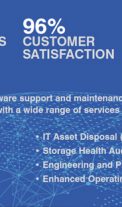For those of us who work in IT every single day, the future of IT can seem obvious. Accenture PLC put together some interesting observations together around future trends some time ago, and those trends that will drive the future of Information Technology. It makes fascinating reading for business IT professionals and indeed business owners.
Platform Architecture…
This certainly one of the most significant trends for the industry, and viewing everything through an application lens will be coming to an end. The architectures that make up platforms will be reliant or selected primarily to cope with increased volumes of data and the shear complexity of data management. It won’t be a selection process based on the ability to support applications.
Relational databases won’t go away, but soon start to make way for other types of databases. Streaming databases are a significant departure from what IT departments have utilised for decades.
Social Platforms…
Social media is continually evolving, and we are already seeing statistics that demonstrate a migration towards social views for businesses rather than the direct search for a company website. This will change the methods in how companies conduct business, with social platforms providing a greater insight into the business, rather than the isolated information you tend to see on company websites.
After all business is ultimately down to the relationships businesses build with people, and social platforms provide that much greater insight into the people behind the business and the personalities to engage with.
Cloud Computing…
This is something we have covered in two recent articles. This has already become extremely pervasive, and the term is almost becoming superfluous. Software as a service (SaaS) and Platforms as a service (PaaS) working with internal applications will cement IT as a driver of business growth. We will see cloud strategies increasing greater functionality and flexibility for businesses, utilising a mix of cloud based applications and platforms. Cloud technology is changing how we conduct our day to day business activities and will continue to become the powerhouse of modern computing.
Data security…
We have seen a huge rise in people involved in data security, the but the future lies in security architecture that can detect threats when they happen, and make decision on an automated process to assess and respond accordingly.
Data privacy…
Increasing government regulation and enforcement of policy will see individual privacy take centre stage. Leading players handling data will require greater understanding of data control as opposed to just processing data. This will lower risks and breaches of any privacy regulations. The pressure is on to protect the individual.
Analytics…
Simple analysis of business intelligence utilising available analytics is not enough now. There is a wealth of unstructured data available with IT leaders needing to work with business leaders to identify how they can leverage the data effectively. They will also need to help source the right kind of analytical services that provide insight and optimise the analytics across a business enterprise.
Architecture…
Information Technology is continually evolving into a service-centric world rather than a server-centric world. Companies are moving away from the typical internal server world to services that are distributed inside and outside of the business.
User Experience…
Process design is currently being driven by a need for optimisation and reducing cost. The future will see a drive towards creating superior user experience, boosting customer satisfaction. Greater use experience will require a layered approach to what is typical today with application design becoming a multidisciplinary exercise using more than just the IT architect and business owner.
Evolving technological trends are probably at their most optimised at present and we have certainly seen the drive towards these trends since Accenture originally produced their report. Cloud based technology, social media, and the need for greater user experience and safeguarding the user are major contributory factors in changing the way we utilise technology to do business. Undoubtedly it will continue to reshape the business landscape, and provide much greater insight into how businesses can proactively progress communications and infrastructure, and how we as business owners can engage more with our customers in the future.
Source: Thank you to Accenture for their excellent visionary report!







